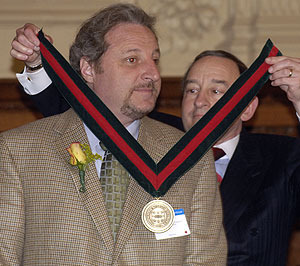An important new academic paper calls for the abolition of patents
 Prominent Washington University (St. Louis) Economists Michele Boldrin (left) and David Levine (below, shown receiving an academic medal) have released a new, short, and extremely hard-hitting paper, titled The Case Against Patents. You can download it for free here.
Prominent Washington University (St. Louis) Economists Michele Boldrin (left) and David Levine (below, shown receiving an academic medal) have released a new, short, and extremely hard-hitting paper, titled The Case Against Patents. You can download it for free here. 
In the paper, Boldrin and Levine mount a full-scale frontal assault on the current American patent system. They say that there is no empirical evidence to suggest that strong patent protection increases innovation or productivity. But there is evidence, the authors argue, that patents have a host of negative consequences. Stagnant industries and firms use patent lawsuits to squash innovative upstarts. The proliferation of patent rights creates wasteful “arms races” as companies divert resources away from innovation and toward patenting (in order not to be out-gunned by rivals with big patent portfolios), which leads to “thickets” of overlapping patent claims that makes deploying new technologies without fear of liability exceedingly difficult. And the lure of patent protection lets loose a flood of lobbying, as incumbents seek new rules protecting them from more innovative rivals. Boldrin and Levine are particularly cutting when they describe what this incessant pro-patent lobbying has done to suppress innovation.
“It should be clear, then, that given this set of players and their incentives, the patent game can have only one equilibrium over time, which is the one we have observed. Starting from a regime of intellectual property protection that, about two centuries back, was restricted in its areas of applicability and limited in both depth and duration over time – that is to say: it was somewhat “reasonable” to the extent it balanced social gains and social costs – we have witnessed a monotone process of progressive enlargement and strengthening of patent laws. At each stage of this process of enlargement the main driving force were the rent-seeking efforts of large, cash-rich companies unable to keep up with new and creative competitors. Patent lawyers, patent officials and wannabe patent trolls usually acted as foot soldiers. While this political economy process is theoretically pretty straightforward – especially because it closely replicates similar experiences in other fields of regulation and, especially, in the development of barriers to free trade – what is still missing is an empirical, quantitative analysis of the stakes involved and of the gains and losses accruing to both the active players and to the rest of society, from the general public to the innovators that, because of IP, never were.
The solution? Boldrin and Levine wants patent law abolished. Indeed, they want an amendment to the U.S. Constitution to make sure that the monster, once killed, can never rise from its grave.
We should be clear on the relationship of Boldrin and Levine’s work to our own. We don’t go nearly as far in The Knockoff Economy as Boldrin and Levine do in this paper. We aren’t calling for patent (or copyright) to be abolished. But our work is, in an important sense, complementary to Boldrin and Levine’s. They say that there is no evidence that strong patent protection sparks innovation. Our book looks at a group of industries which lack strong patent and copyright protection, and we observe that there is plenty of innovation anyway. We’re taking on the same problem, from different directions. And, of course, we’re more circumspect in what we’re advocating. But no matter: the Boldrin and Levine paper is worth your attention.



